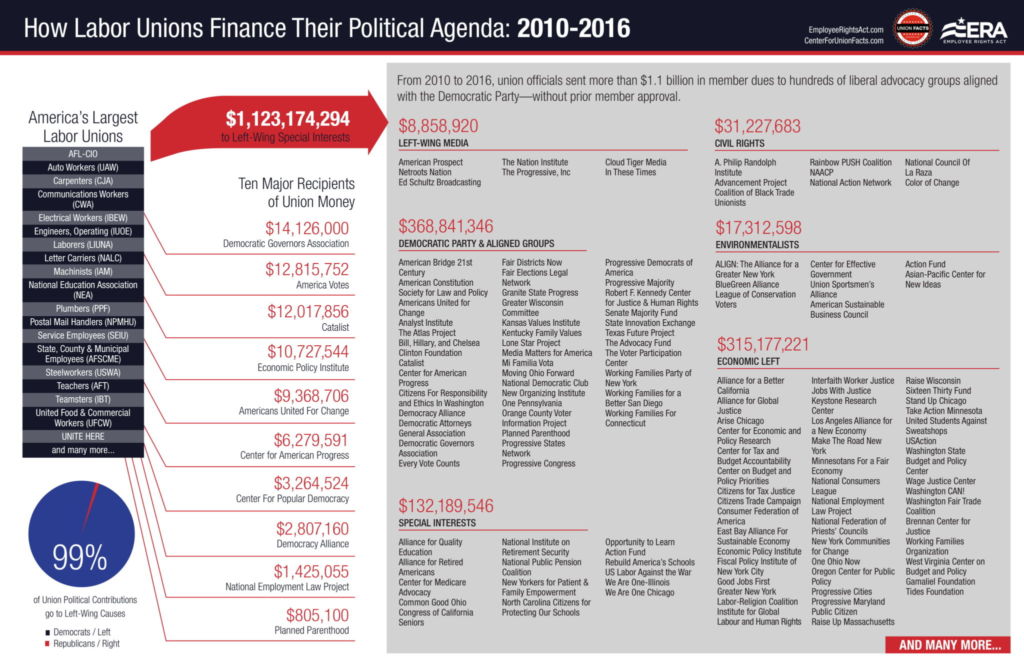Union Loophole is Challenged in Massachusetts: Could Minnesota be Next?
Our friends at the Goldwater Institute (named for the late Sen. Barry Goldwater) are challenging a state law that gives unions an unfair advantage in our electoral and legislative process.
“Massachusetts is one of only six states that prohibit employers—but not unions or other groups—from contributing to political parties, committees, or candidates,” said Jim Manley, a senior fellow at the Goldwater Institute and lead attorney for the plaintiffs. “This uneven playing field violates state and federal constitutional guarantees of equal protection, free speech, and free association. All groups ought to have the same ability to participate in the political process—regardless which side of the bargaining table they sit on—and that’s why we’re in court today.”
The loophole bans political contributions from employers while allowing unions, including out of state unions, to contribute up to $15,000 to a single candidate. Individuals can only donate up to $1,000.
Minnesota has a similar law. “A corporation may not make a contribution or offer or agree to make a contribution directly or indirectly, of any money, property, free service of its officers, employees, or members, or thing of monetary value to a political party, organization, committee, or individual to promote or defeat the candidacy of an individual for nomination, election, or appointment to a political office.” The only exception is for independent expenditures (required by the 2010 Citizen’s United case where the U.S. Supreme Court said political spending is a form of protected speech under the First Amendment, and the government may not keep corporations or unions from spending money to support or denounce individual candidates in elections).
According to election law expert Reid Lebeau, corporations in Minnesota are specifically constrained in law while the law is silent on unions, thereby creating a loophole. Unions are relatively free to contribute and spend their general treasury funds (union dues and fees).
Labor and election laws passed in the last century, at the federal and state level (especially in traditionally liberal states), need a total overhaul. This includes disclosure laws. The laws reflect an increasingly corrupt relationship between elected officials and government unions. Unions have captured too many elected officials—and this often cozy arrangement does not serve the rank and file members whose dues are used to fund politics rather than serve their members.
“We’ve seen the union loophole taint election after election here in our state,” commented Paul D. Craney, a MassFiscal Board Member and the organization’s spokesman.
In forced-dues states like Minnesota, teachers and cops are forced to fund the political agenda of their union, whether they agree with the union or not.
So for example, in 2016, the teachers’ union and AFSCME (both AFL-CIO affiliated) and the SEIU all supported candidate Hillary Clinton. That means that public employees who preferred one of the GOP candidates, or Bernie Sanders, were essentially forced to write a check to Hillary Clinton and the DNC in order to keep their job. Doesn’t that seem out of whack in America? (see chart below)

In Minnesota, the state even serves as a collection agency for government unions, taking dues and fees from employee paychecks and depositing the funds in the bank accounts of Education Minnesota, AFSCME, SEIU and MAPE. This deprives public employees of any leverage over a union.
This is how laws like the one being challenged in Massachusetts, and on the books in Minnesota, get passed; the legislatures have been captured and corrupted. Corporate employers, who are so often under attack by the left, and regulated by government, should have a fair chance to participate and compete in a free marketplace of ideas. Or perhaps conversely, the unions should have to function under the same restrictions as corporations.
If Goldwater succeeds in Massachusetts, perhaps they could bring the next case here. We would be happy to assist.